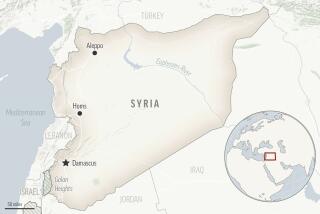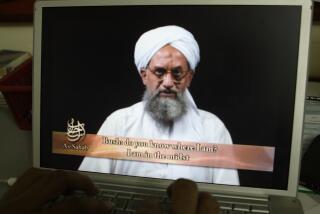Yemen forces kill suspected Al Qaeda leader leader
- Share via
Reporting from Cairo — Yemeni special forces killed a suspected Al Qaeda leader and captured four fighters as the country increased pressure on the militant network operating in several key tribal provinces, officials said Wednesday.
Yemen’s government, juggling a civil war in the north and a secessionist movement in the south, had been slow to react to a widening Al Qaeda threat. Its stepped-up raids come amid international concern over the country’s ability to defeat a branch of Yemeni and Saudi fighters that has claimed responsibility for the failed Christmas Day attack on a Northwest airliner.
Yemen’s Saba news agency reported that Abdullah Mehdar, described as a leader of an Al Qaeda cell, was killed in a shootout after troops surrounded a house in an eastern stronghold where he and other militants had gathered. The siege began Tuesday and lasted into early Wednesday. Two Yemeni soldiers were killed in an earlier ambush by Mehdar’s followers in a nearby town.
“Abdullah Mehdar was killed last night by security forces that had besieged the house he hid in,” Ali Hasan Ahmadi, the governor of Shabwa province, told reporters Wednesday.
Strikes against Al Qaeda bases and training camps by Yemeni forces intensified several weeks ago with the aid of U.S. intelligence. More than 60 militants were killed in raids in the days before the botched attempt to down the Northwest jet, allegedly carried out by a Nigerian under the guidance of Al Qaeda in Yemen.
Since then, Washington has urged the government of Yemeni President Ali Abdullah Saleh to do more to rout a militant network with an estimated 2,000 operatives and sympathizers who have found refuge in remote tribal lands. The U.S. and other Western nations have questioned Yemen’s commitment, especially by a government that is regarded as corrupt and that has released militants who later returned to the battlefield.
President Obama has said he will not send U.S. ground troops to the Arabian peninsula nation. Yemen has bristled at suggestions that it is ill-equipped to confront Al Qaeda and has said that it doesn’t want U.S. military personnel other than those training its special forces.
In an interview with Abu Dhabi TV over the weekend, Saleh said he was “determined to stand up to the challenges” of Al Qaeda. But he stressed that he would be willing to negotiate with militants who renounced violence.
“Dialogue is the best way,” he said, “even with Al Qaeda, if they set aside their weapons and return to reason.”
More to Read
Sign up for Essential California
The most important California stories and recommendations in your inbox every morning.
You may occasionally receive promotional content from the Los Angeles Times.














